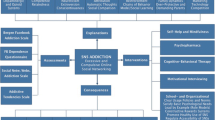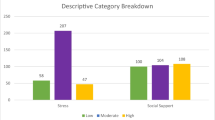Abstract
The purpose of this study was to investigate the efficacy of a preventive counseling program for improving psychological hardiness (PsyH) and the positive use of social network sites (SNSs). The sample consisted of 30 students from Mu’tah University in Jordan who were randomly assigned into either an experimental group (15) or a control group (15). Two constructed scales - the PsyH scale and the Positive Use of SNSs scale - were administered to both groups pre-test and post-test, and a one-month follow-up measure was also administered to the experimental group. The findings revealed that the preventive counseling program significantly improved the level of PsyH and the positive use of SNSs and seemed to have sustained efficacy.
Similar content being viewed by others
References
Akin, A., & Iskender, M. (2011). Internet addiction and depression, anxiety and stress. International Online Journal of Educational Sciences, 3(1), 138–148.
Almahaireh, A. (2016). Efficacy of a supervision program based on cognitive behavioral model in improving counseling skills and reducing psychological stresses among school counselors in Tafila. Dirasat Educational Sciences, University of Jordan, 43(3), 1981–2001.
American psychiatric association and American psychiatric association (2000). Task force on DSM-IV. Diagnostic and statistical manual of mental disorders: DSM-IV-TR. Washington, DC: American psychiatric association 4.
Bahrainian, S. A., Alizadeh, K. H., Raeisoon, M. R., Gorji, O. H., & Khazaee, A. (2014). Relationship of internet addiction with self-esteem and depression in university students. Journal of Preventive Medicine and Hygiene, 55(3), 86.
Baker, D. A., & Algorta, G. P. (2016). The relationship between online social networking and depression: a systematic review of quantitative studies. Cyber Psychology, Behavior, and Social Networking, 19(11), 638–648. https://doi.org/10.1089/cyber.2016.0206
Bollen, J., Gonçalves, B., Ruan, G., & Mao, H. (2011). Happiness is assortative in online social networks. Artificial Life, 17(2), 237–251.
Caplan, S. E. (2003). Preference for online social interaction: a theory of problematic internet use and psychosocial well-being. Communication Research, 30(6), 625–648. https://doi.org/10.1177/0093650203257842
Çelik, Ç. B. (2016). Educational intervention for reducing internet addiction tendencies. the Turkish journal on. Addiction, 3(3), 175–186.
Chen, S. K. (2012). Internet use and psychological well-being among college students: a latent profile approach. Computers in Human Behavior, 28(6), 2219–2226. https://doi.org/10.1016/j.chb.2012.06.029
Cohen, L., Chavez, V., & Chehimi, S. (2010). Prevention is primary: Strategies for community well-being. Hoboken: Wiley.
Conyne, R. K. (2004). Preventive counseling: Helping people to become empowered in systems and settings. Abingdon: Routledge.
Deandrea, D., Ellison, N., LaRose, R., Steinfield, C., & Fiore, A. (2012). Serious social media: On the use of social media for improving students’ adjustment to college. The Internet and Higher Education, 15(1), 15–23. https://doi.org/10.1016/j.iheduc.2011.05.009
Donelly, E., & Kuss, D. J. (2016). Depression among users of social networking sites (SNSs): the role of SNS addiction and increased usage. Journal of Addiction and Preventive Medicine, 1(2), 107.
Du, Y. S., Jiang, W., & Vance, A. (2010). Longer term effect of randomized, controlled group cognitive behavioral therapy for Internet addiction in adolescent students in Shanghai. Australian and New Zealand Journal of Psychiatry, 44(2), 129–134. https://doi.org/10.3109/00048670903282725
Ellison, N. B. (2007). Social network sites: definition, history, and scholarship. Journal of Computer-Mediated Communication, 13(1), 210–230.
Ellison, N. B., Steinfield, C., & Lampe, C. (2007). The benefits of Facebook “friends:” social capital and college students’ use of online social network sites. Journal of Computer-Mediated Communication, 12(4), 1143–1168. https://doi.org/10.1111/j.1083-6101.2007.00367.x
Hamburger, Y., & Vinitzky, G. (2010). Social network use and personality. Computers in Human Behavior, 26(6), 1289–1295. https://doi.org/10.1016/j.chb.2010.03.018
Hasel, K. M., Abdolhoseini, A., & Ganji, P. (2011). Hardiness training and perceived stress among college students. Procedia - Social and Behavioral Sciences, 30, 1354–1358.
Iorliam, A., & Ode, E. (2014). The impact of social network usage on university students academic performance: a case study of Benue state university Makurdi, Nigeria. International Journal on Computer Science and Engineering, 6(7), 275.
Iskender, M., & Akin, A. (2010). Social self-efficacy, academic locus of control, and internet addiction. Computers & Education, 54(4), 1101–1106.
Kim, J. U. (2007). A reality therapy group counseling program as an Internet addiction recovery method for college students in Korea. International Journal of Reality Therapy, 26(2), 3–9.
Kim, J. (2008). The effect of a R/T group counseling program on the internet addiction level and self-esteem of internet addiction university students. International Journal of Reality Therapy, 17, 4–12.
Kim, J., & Lee, J. E. R. (2011). The Facebook paths to happiness: effects of the number of Facebook friends and self-presentation on subjective well-being. Cyber Psychology, Behavior, and Social Networking, 14(6), 359–364. https://doi.org/10.1089/cyber.2010.0374
Kirschner, P., & Karpinski, A. (2010). Facebook and academic performance. Computers in Human Behavior, 26(6), 1237–1245. https://doi.org/10.1016/j.chb.2010.03.024
Kramer, A. D., Guillory, J. E., & Hancock, J. T. (2014). Experimental evidence of massive-scale emotional contagion through social networks. Proceedings of the National Academy of Sciences, 111(24), 8788–8790.
Kuo, W. H., & Tsai, Y. M. (1986). Social networking, hardiness and immigrant's mental health. Journal of Health and Social Behavior, 27, 133–149.
Lambert Jr., C. E., & Lambert Jr., V. A. (1999). Psychological hardiness: state of the science. Holistic Nursing Practice, 13(3), 11–19.
Maddi, S. (2002). The story of hardiness: Twenty years of theorizing, research, and practice. Consulting Psychology Journal: Practice and Research, 54(3), 173–185. https://doi.org/10.1037/1061-4087.54.3.173
Maddi, S. R., Erwin, L. M., Carmody, C. L., Villarreal, B. J., White, M., & Gundersen, K. K. (2013). Relationship of hardiness, grit, and emotional intelligence to internet addiction, excessive consumer spending, and gambling. The Journal of Positive Psychology, 8(2), 128–134.
Nayyeri, M., & Aubi, S. (2011). Prediction well-being on basic components of hardiness. Procedia - Social and Behavioral Sciences, 30, 1571–1575.
Nie, J., Zhang, W., & Liu, Y. (2017). Exploring depression, self-esteem and verbal fluency with different degrees of internet addiction among Chinese college students. Comprehensive Psychiatry, 72, 114–120.
Oh, H. J., Ozkaya, E., & LaRose, R. (2014). How does online social networking enhance life satisfaction? The relationships among online supportive interaction, affect, perceived social support, sense of community, and life satisfaction. Computers in Human Behavior, 30, 69–78. https://doi.org/10.1016/j.chb.2013.07.053
Ostovar, S., Allahyar, N., Aminpoor, H., Moafian, F., Nor, M. B. M., & Griffiths, M. D. (2016). Internet addiction and its psychosocial risks (depression, anxiety, stress and loneliness) among Iranian adolescents and young adults: A structural equation model in a cross-sectional study. International Journal of Mental Health and Addiction, 14(3), 257–267.
Öztürk, C., Bektas, M., Ayar, D., Öztornaci, B., & Dilek, Y. (2015). Association of personality traits and risk of internet addiction in adolescents. Asian Nursing Research, 9(2), 120–124.
Paul, J., Baker, H., & Chochran, J. (2012). Effect of online social networking on student academic performance. Computers in Human Behavior, 28(6), 2117–2127. https://doi.org/10.1016/j.chb.2012.06.016
Sadaghiani, N. S. K. (2011). The role of hardiness in decreasing the stressors and biological, cognitive and mental reactions. Procedia - Social and Behavioral Sciences, 30, 2427–2430. https://doi.org/10.1016/j.sbspro.2011.10.474
Sheard, M. (2009). Hardiness commitment, gender, and age differentiate university academic performance. British Journal of Educational Psychology, 79(1), 189–204.
Stavropoulos, V., Alexandraki, K., & Motti-Stefanidi, F. (2013). Recognizing internet addiction: Prevalence and relationship to academic achievement in adolescents enrolled in urban and rural Greek high schools. Journal of Adolescence, 36(3), 565–576. https://doi.org/10.1016/j.adolescence.2013.03.008
Stice, E., Rohde, P., Seeley, J. R., & Gau, J. M. (2008). Brief cognitive-behavioral depression prevention program for high-risk adolescents outperforms two alternative interventions: a randomized efficacy trial. Journal of Consulting and Clinical Psychology, 76(4), 595.
Tarsha, A. (2016). The role of existential therapy in the prevention of social media driven anxiety. Existential Analysis, 27(2), 382–389.
Taylor, S. (2012). Health psychology (8th ed.). New York: Mcgraw-Hill Publishers.
Valkenburg, P. M., Peter, J., & Schouten, A. P. (2006). Friend networking sites and their relationship to adolescents' well-being and social self-esteem. Cyber Psychology & Behavior, 9(5), 584–590.
Vera, E. (2012). The Oxford handbook of prevention in counseling psychology. Oxford: Oxford University Press.
Author information
Authors and Affiliations
Corresponding author
Rights and permissions
About this article
Cite this article
Almahaireh, A.S.F., Aldalaeen, A.S.R. & Takhaineh, S.K.A. Efficacy of a Preventive Counseling Program for Improving Psychological Hardiness and the Positive Use of Social Network Sites among Students at Risk. Int J Adv Counselling 40, 173–186 (2018). https://doi.org/10.1007/s10447-018-9319-1
Published:
Issue Date:
DOI: https://doi.org/10.1007/s10447-018-9319-1




